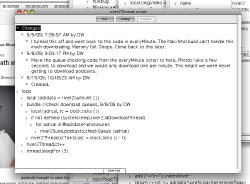
|
|||||||||||||||||||||||||||||||||||||||||||||||||||||
|
Phil Jones on how things connect Phil Jones and I agree on how bootstraps work. He wrote a beautiful piece in 2006, and just re-ran it with links to 2009 bits that illustrate his points. It's a case study in how Internet bootstraps work. They're about 10 percent technology and 90 percent working with people, trying to figure out what they want and getting it for them. In the process something builds out that has a cohesive whole, and another layer is formed. A few years go by and we do it again.
In the end it really is all about working together. And I'm glad that Phil is there. It's nice to have someone watching who sees how it all fits together. Then, this evening, a really insightful Webmonkey piece came out. It's the same insight that William Mougayar had, in a comment here yesterday. When this bootstrap plays out it will all be seen to have happened at the workstation. What Matt and Wordpress did over the weekend was the nuclear fuel that lit the fire. But the big winners will be the readers, skimmers and Twitter clients that will, as Webmonkey puts it so well: "We'll just have to stop calling them Twitter clients and start calling them what they should be referred to as: news clients." Amen. Sure. Of course. I am a totally f*cked up human being. Now that that's out of the way, let me explain. Last night on Twitter, Staci Kramer of PaidContent asked what's the difference betwen the default list in River2 and Twitter's suggested user list. There's a qualitative difference and a quantitative one. I use the default list for two purposes: 1. To provide an initial user experience that isn't blank. In this sense it is like Twitter's list. 2. To highlight interesting uses of RSS and clouds and reading lists, things I want to encourage people to support. By throwing them a bit of recognition, I hope to create an incentive to support the features that River2 is leading the way with. I did this with Radio too. I do it with Scripting News. I'm unabashed about it. It's how you bootstrap new stuff. It's a good thing. No one has paid for position on the list, but I don't guarantee that I will never sell a position on the list. But I will never put a feed on the list that I wouldn't put there if they didn't pay.
1. My list is like the default list in Tweetdeck or Tweetie or Google Reader. I don't have a monopoly. I am not the only game in town. If people dislike my choices they can vote with their feet. Twitter is the whole ballgame. As I said yesterday, it's as if Google favored their friends in search results. Or if Tim Berners-Lee made it so that 1/4 of every web page had an ad for Om, ReadWriteWeb, Tim O'Reilly or TechCrunch. 2. I have a shopping list in my pocket. On it I list products I'm going to buy when I go to the supermarket. That's also like the Suggested User List. The products on the list profit from being there. But Chef Boyardee won't notice whether or not he's on my list (he's not). River2 is a teeny weeny little product compared to the mighty Twitter, which delivers hundreds of thousands of followers to people on its list. 3. I try not to influence editorial content through my choices. I've gone with big pubs like Reuters, BBC, the Guardian, CNET, NYT. Their techies hopefully will appreciate the respect, but if it influences the writers I will remove it immediately. In TwitterLand, the problem isn't so much that Twitter tries to influence, that's understandable, it's that the reporters don't object. There will continue to be a default list in River2. Here's a screen shot of one of the objects that makes up the River2 aggregator. The top of the script is a blog. We've always done it this way. There are scripts in the system that are still in use with "posts" at the top that date back to the mid-90s. From lots of team members, most of whom have gone on to other things. I imagine they've taken some of our practices with them, as we inherited practices from teams we came from and code we used to work on. There's a culture to programming that's mostly invisible to non-programmers. Another example of Narrate Your Work, the philosophy of the blogger and reporter. |
"The protoblogger." - NY Times.
"The father of modern-day content distribution." - PC World.
One of BusinessWeek's 25 Most Influential People on the Web. "Helped popularize blogging, podcasting and RSS." - Time.
"The father of blogging and RSS." - BBC.
"RSS was born in 1997 out of the confluence of Dave Winer's 'Really Simple Syndication' technology, used to push out blog updates, and Netscape's 'Rich Site Summary', which allowed users to create custom Netscape home pages with regularly updated data flows." - Tim O'Reilly.
My most recent trivia on Twitter. On This Day In: 2008 2007 2006 2005 2004 2003 2002 2001 2000 1999 1998 1997. |
||||||||||||||||||||||||||||||||||||||||||||||||||||
|
© Copyright 1997-2009 Dave Winer. Previous / Next |
|||||||||||||||||||||||||||||||||||||||||||||||||||||

 Now for the differences.
Now for the differences.


